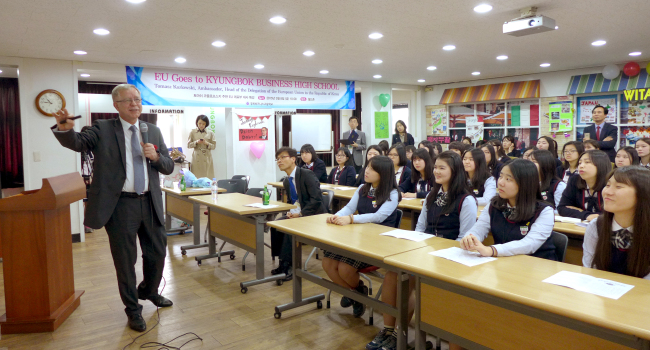The European Union Embassy kicked off its “EU Goes to Schools 2015” program, designed to promote awareness of Europe among Korean high school students, with the first lecture at the Kyungbok Business High School in western Seoul on Friday.
EU Ambassador Tomasz Kozlowski and 20 other ambassadors from EU member states will visit 42 schools this year, and present European history, politics, economy and culture, as well as their career.
The program started last year in collaboration with the Seoul Education Office, and was received with high interest. For this year, 68 schools applied, including 21 reapplying from last year.
Kozlowski, who is Polish, highlighted the continental organization’s motto, “United in Diversity,” and explained the history and governance of the 28 member states.
“The EU was created out of a joint effort in 1950 to prevent wars,” Kozlowski said. “As a peace project since the beginning, it has led to today’s common security policies and arrangements.”
EU Ambassador Tomasz Kozlowski and 20 other ambassadors from EU member states will visit 42 schools this year, and present European history, politics, economy and culture, as well as their career.
The program started last year in collaboration with the Seoul Education Office, and was received with high interest. For this year, 68 schools applied, including 21 reapplying from last year.
Kozlowski, who is Polish, highlighted the continental organization’s motto, “United in Diversity,” and explained the history and governance of the 28 member states.
“The EU was created out of a joint effort in 1950 to prevent wars,” Kozlowski said. “As a peace project since the beginning, it has led to today’s common security policies and arrangements.”

He stressed that Europeans were able to put their bloody history behind them and unite around common objectives. A few Balkan countries are currently negotiating for EU membership, he noted.
The criteria for EU membership are democracy, a market economy, the rule of law and human rights. Capital, people, goods and services freely move across borders in the EU bloc, which is home to 500 million citizens.
The main objective is to maintain peace and harmony not only in Europe, but across the world, according to the ambassador. The EU’s people benefit from economic development and social solidarity.
He also touched upon different institutions: the European Council, European Commission, the Court of Justice of the European Union, the European Central Bank, and the European Parliament.
Students were surprised to learn that the Estonian, Finnish, Hungarian and Korean languages belong to the same Ural-Altaic linguistic family.
Mutual understanding and cooperation are high between the EU and Korea, Kozlowski said, as both sides have extensive cooperation in science and technology, energy, environment, education, public health, development assistance, human rights, tourism and culture.
During the Europe Day 2015 reception at Lotte Hotel last Monday, Foreign Minister Yun Byung-se said that Europe’s experience of transition from communism and regional integration provides a model for Korea’s unification and reconciliation with its neighbors.
Korea is the first Asian country with which the EU concluded three agreements on political cooperation, free trade and crisis management. Korea is also one of the EU’s 10 strategic partners worldwide.
The EU is Korea’s third-largest trading partner after China and ASEAN, with bilateral trade volume of $114 billion last year. The EU is the largest foreign investor in Korea, while Korea also invests heavily in Europe.
The ambassador highlighted educational opportunities in Europe, including the Erasmus Plus program for the 2014-20 period aimed at boosting knowledge, employment and student exchanges.
Responding to the increasing number of Korean students ― currently 10,000 ― who are eyeing European education, the Study and Research in Europe Fair 2015 will be held at Ewha Womans University on Wednesday.
During a question-and-answer session, third-grader Lee Da-hee asked Kozlowski how he overcame difficulties in life.
He responded, “Be self-confident, curious and willing to learn. Be an optimist and do not think about failures.”
“Have different options, and establish yourself with knowledge, resilience and experience to build self-confidence,” he added.
Answering second-grader Jung Ye-won’s question about his life goals, Kozlowski said that although life was unpredictable and complicated, it was wise to have some general goals.
“Get a fulfilling and satisfying job to produce results, and do not work only for money. Work to develop yourself,” he advised. “Never be too ambitious, but be realistic. For example, I do not dream of becoming the United Nations secretary-general like Mr. Ban Ki-moon.”
The ambassador also stressed the importance of having a work-life balance and family commitment. “Please enjoy your life. Life is not only about studying. Koreans work too hard,” he said.
By Joel Lee (joel@heraldcorp.com)
-
Articles by Korea Herald


![[AtoZ into Korean mind] Humor in Korea: Navigating the line between what's funny and not](http://res.heraldm.com/phpwas/restmb_idxmake.php?idx=644&simg=/content/image/2024/04/22/20240422050642_0.jpg&u=)
![[Exclusive] Korean military set to ban iPhones over 'security' concerns](http://res.heraldm.com/phpwas/restmb_idxmake.php?idx=644&simg=/content/image/2024/04/23/20240423050599_0.jpg&u=20240423183955)



![[Graphic News] 77% of young Koreans still financially dependent](http://res.heraldm.com/phpwas/restmb_idxmake.php?idx=644&simg=/content/image/2024/04/22/20240422050762_0.gif&u=)
![[Herald Interview] Why Toss invited hackers to penetrate its system](http://res.heraldm.com/phpwas/restmb_idxmake.php?idx=644&simg=/content/image/2024/04/22/20240422050569_0.jpg&u=20240422150649)






![[Exclusive] Korean military to ban iPhones over security issues](http://res.heraldm.com/phpwas/restmb_idxmake.php?idx=652&simg=/content/image/2024/04/23/20240423050599_0.jpg&u=20240423183955)



![[Today’s K-pop] Ateez confirms US tour details](http://res.heraldm.com/phpwas/restmb_idxmake.php?idx=642&simg=/content/image/2024/04/23/20240423050700_0.jpg&u=)